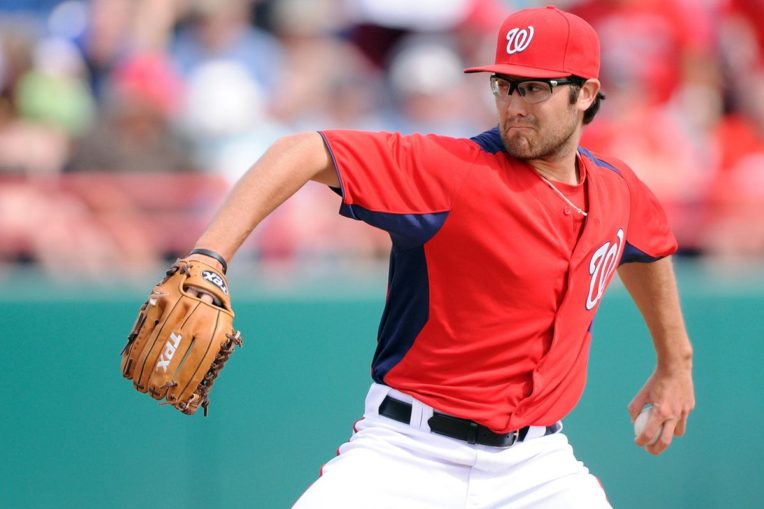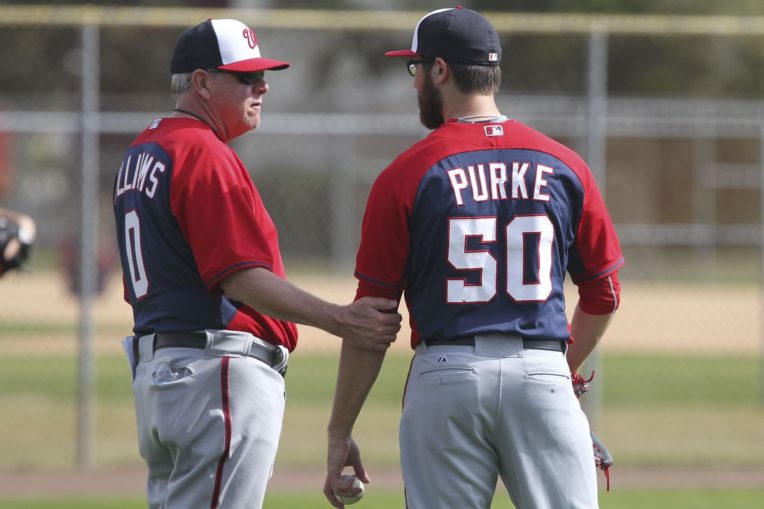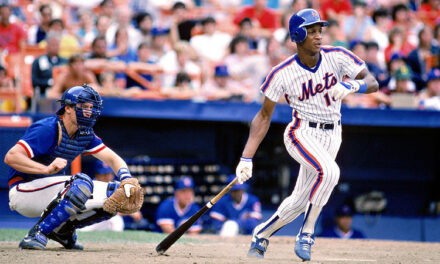
Roster battles are always a fun aspect of spring training when clubs are evaluating such decisions as who will be the fifth starter in the rotation, the backup infielder/outfielder and who to carry as the final bullpen arm.
These decisions can come down to the final day of spring, where players are hoping to see their name added to the 25-man roster. For these hopeful players, hearing their name among the 24 other players is like one of the children in Roald Dahl’s classic, Charlie and the Chocolate Factory, unwrapping a Wonka Bar and finding the Golden Ticket nestled inside.
Although the guaranteed entry won’t be for an exuberant candy factory, instead, the lucky winner gets to have his dream realized: making an Opening Day roster.
Left-handed reliever Matt Purke is hoping for that fate.
Purke, 27, signed a minor league deal with an invite to spring with the Mets this past off-season. The attraction for Purke, who had several offers from other clubs, was a need for a second lefty out the pen to pair with Jerry Blevins.
The lefty is a former Washington Nationals third-round draft pick back in 2011, who bonded with Blevins when he was a member of the Nationals from 2014 to the end of March of 2015, prior to being traded to the Mets.
Along with the apparent need the Mets had in their pen, Purke’s intrigue with working under Mickey Callaway and Dave Eiland helped make his decision an easier one. Purke cites their credibility and success with working with some of the game’s best pitchers, even going as far to say, “If you’re a pitcher, this is the perfect place to be.”
The road to the majors was supposed to be different for Purke, who was originally drafted 14th overall in the ’09 Draft by the Texas Rangers as a starting pitcher. He turned down their offer to attend Texas Christian University (TCU), where he continued his career.
In his freshman season, Purke posted a 16-0 record, with a 3.02 ERA and 1.07 WHIP in 116 innings of work. His efforts earned him Baseball America’s Freshman of the Year honors for 2010.
A shoulder injury limited Purke to just 11 starts in his sophomore year, causing his draft stock to fall. Nevertheless, Purke and the Nationals came to an agreement on a contract, though, shoulder debridement and Tommy John surgery interrupted Purke’s progression through the minors.
For his part, Purke took the injuries in stride, focusing on the mental aspect of the game during his baseball absence. Following the ’15 season, the Nationals released the left-hander, who signed a minor-league deal with the Chicago White Sox later that off-season. That decision fared well for Purke, as the team gave him his first opportunity in the majors, making his debut on May 20, 2016, against the Kansas City Royals.
With his family on hand at U.S. Cellular Field in Chicago, Purke entered with two outs in the eighth with the Royals up, 4-1. After a single by Salvador Perez, Purke recorded his first major league out and a strikeout, getting left fielder Alex Gordon to strike out on three pitches.
In total, Purke has appeared in 12 major league games, all of which came in ’16. Purke spent the ’17 season with the Charlotte Knights, the White Sox’ Triple-A team in the International League.
Among pitchers with a minimum of 60 innings pitched, Purke was tied for fifth among International League pitchers in strikeout percentage (28.5) and fared better than his 3.84 ERA suggested, posting a 3.20 FIP over 48 games.
Purke held left-handed hitters to a .196 batting average with 42 strikeouts in 28.2 innings last year. The Texas native is hopeful that he can pair with Blevins to take the pressure of the pen in facing tough lefties late in the game. The importance of having an effective bullpen does not go unnoticed by Purke, who understands the specific roles and how they all play into having a winning season.
The opportunity to showcase his stuff is all Purke could ask for, as he remains humble and appreciative of the chance he’s been given this spring.
The precious Golden Ticket to the majors is still up for grabs.
I had the privilege of speaking with Purke in early March, where we discussed not signing with the Rangers out of high school, his injury history, and why he chose to sign with the Mets this past off-season.

MMO: Who were some of your favorite players growing up?
Purke: I was a ‘90s baby, so when I started taking interest in baseball as a young kid that was when the Braves were at their peak. I was a big fan of Tom Glavine, Greg Maddux and John Smoltz.
I watched the Braves, that was my favorite team growing up. I tried to idolize myself after Glavine.
MMO: Who introduced you to the game?
Purke: My brother and dad got me into it when I was a little tyke. They got me started on it.
MMO: At what age did you start primarily pitching?
Purke: I didn’t start pitching until I was 10-years-old. Ten was, where I grew up in East Texas, when we started pitching on our own.
MMO: You were a standout high school starting pitcher and were selected 14th overall in the 2009 MLB Draft by the Texas Rangers. Was it difficult not signing out of high school and instead attending Texas Christian University?
Purke: Yeah, that was definitely a big decision, especially for an 18-year-old kid. Looking back, it’s one of those life decisions that I had to make early on, and I definitely don’t regret it.
I really enjoyed my time at T.C.U. and I was able to meet my wife there. You really can’t put a price tag on what that value was to me, to be able to meet her and have my family.
MMO: Do you feel like you grew as a pitcher by attending T.C.U.?
Purke: Yes, 100 percent. College gives you an inside into what it takes to be, not completely dependent on yourself, but you’re on your own. You have to be responsible, you have to be on time, you have to get to class, I had to be at weights. There was no one there to hold my hand. You had to take care of it and be there and you were responsible for what you did. It definitely matured me.
Everyone talks about if you go to college you’re delaying your career. But I think you’re advancing your career, just as you would in the lower levels of the Minor Leagues. You see most guys that go to college and have successful careers when they get to the Minor Leagues they’re allowed to just excel as fast as they possibly can.
Whereas, if you’re a young, especially pitcher, they like to set the pace for you. I definitely think that college was something that helped me grow up a lot off the field, but definitely on the field.
MMO: Prior to the 2011 MLB Draft, did you have any idea that the Washington Nationals were looking to select you in the third-round?
Purke: Honestly, no. That was a very interesting time for me, just because of the year that I had my freshman year and then with everything that came about in my sophomore year. It was a different draft than I expected initially going in, but I was thankful for the opportunity the Nationals did give me thereby selecting me. We were able to work out a deal and I was able to get into pro ball.
MMO: You’ve dealt with many setbacks in your career to date, with shoulder debridement and Tommy John surgery. How difficult was it for you to undergo such surgeries after finally signing as a professional?
Purke: It’s definitely tough. You want to be on the field. When you sign those contracts and you’re in pro ball, you’re at that next level and a few steps away from eclipsing your dream. To have those injuries and have those setbacks is tough. It can wear on you pretty hard.
I think it was an opportunity for me to definitely grow on my mental side of the game and things like that. It was something that I had to go through to ultimately be in the spot that I am today. It was definitely tough and you never want anyone to get hurt. I definitely think I learned some things and grew from it and it helped me become the player that I am today.

MMO: At what point did you transition to the bullpen, and what were your initial reactions to it?
Purke: I think it was towards the end of 2015. I was coming back pitching off Tommy John in 2014, and I sprained my ankle towards the end of the season. Instead of trying to get me built back up as a starter they just said, “We’re going to put you out in the pen and see how it goes from there.”
I made that initial transition from there. Since then, the last two years with the White Sox, I’ve been a full-time reliever. I don’t think the transition was very difficult at all, it was just a different mindset going into it. Knowing that you’ve got to be prepared every day to have your number called. I definitely think I’ve grown comfortable with the role and I think I can be very successful at it.
MMO: You were a starting pitcher your whole life. Was there an adjustment period to converting to the bullpen for you?
Purke: It’s just more of you have to be mentally prepared to be ready to play. As a starting pitcher, you have four days in-between where you have your work that you do, but once game time comes there are no responsibilities for you.
You just get ready and you have the set things that you do leading up to your next game. As a reliever, you can be called on at any point, so you’ve got to be focused and be prepared to go out there and compete. I definitely like the challenge of going out there and pitching and being in those types of situations.
As you can see nowadays, they’re starting to put a lot of premium on middle-to-late innings. You’ve got guys that have to get you over the hump and get you to the finish. It’s a challenge and I welcome the challenge. I think that I have what it takes and I’m prepared each day to do my job.
MMO: You can definitely see the climate shifting in terms of the higher degree of importance clubs are placing on their middle to late-inning relief arms. And it definitely is accentuated by their bigger paydays.
Purke: Yeah, these games are getting shorter and shorter. I mean, it’s becoming how the game is going in that hitters are getting better and better, so it’s harder for these starters to go deeper into the game. You really have to have those guys that can be those bridges to get you to the end so you can finish it off.
It’s definitely helpful and, as you can see, the market for relievers is going up, which no reliever is going to complain about.
MMO: A date that you’ll always remember is May 20, 2016: your MLB debut. What are some of your memories from that day?
Purke: Oh man, it was kind of crazy because I got called up on the 13th, so I spent about seven or eight days just taking everything in. Just kind of waiting to see when I’d get my opportunity. That day I just remember being out there and everything kind of lined up to where I kind of knew that this would be an opportunity for me to get in there.
To go out there on the field and to achieve the dream that I had started when I was four-years-old was something special to me and something I won’t forget. I had my family there and I had my wife with me. It’s something we’ll hold special in our hearts forever.
MMO: You signed a minor league deal with the Mets pretty early on in the off-season, and there were reports you had several different options in terms of teams to sign with. What made you choose the Mets to sign with?
Purke: Obviously, last year was very disappointing for them. It didn’t go the way they thought it would go due to guys getting hurt and things like that. I really just looked at it like this was an opportunity and a place where I can come in and compete for a job. Try to be a guy that could match up with Jerry Blevins and that way we can work together and be able to handle the lefties and take some of the pressure off of him. So that was what drew me to that situation. The Mets looked like the perfect opportunity that there were some spots to come in and compete for.
Then with them bringing in Dave Eiland and Mickey Callaway, if you’re a pitcher this is the perfect place to be. You have two guys that have been very successful and have had a lot of really, really good pitchers under their command. For me, it just made a lot of sense to come here and try to make a difference and be an asset.
MMO: Has the relief contingent been helpful to you so far in spring?
Purke: Everyone’s been great. I actually knew Jerry back in 2015 when I was still with the Nationals, and he was there before he got traded over to the Mets. I had known him before and so for him and I, we built that relationship. It was really easy for us to pick back up on that.
But everyone has been great. The bullpen is a big group and we’re all pulling for each other and we’re constantly trying to put together our best efforts out there. We all realize that the more we’re successful the more the team is and that’s good for everybody. It’s a good group of guys and I think this team is going to surprise a lot of people.

MMO: I was always curious if there were any major differences in being a non-roster invitee as opposed to being a guy on the 40-man roster?
Purke: There are some subtle differences just to the guys that are on the roster and guys who aren’t on the roster. But realistically, it’s the same game. We all realize and everyone knows that in that room that everybody at some point could be called upon to help the team. And that’s really what it’s about.
Only 25 guys get to make the team out of camp, but realistically, you could use anywhere up to 40 or 50 guys in a year. So it’s really just coming in, getting your work done and realizing that if you take care of your business and do what you need to do that the opportunity will be there at some point. You just have to be ready to take it.
MMO: How far in advance are you given notice that you’ll be pitching on a given day?
Purke: It just depends. Early on, there’s a lot of guys that have to get in, so we kind of have our schedules and stuff like that. Things can change on a day-to-day basis, but you definitely know a couple of days or a day or so before you’re going to get back out there. As spring goes along and it’s starts to become a smaller and smaller group, it’ll get more clear on when you’ll be out there.
MMO: I know you’ve only been with the Mets for just a short period, but have you noticed varying pitching philosophies between the Nationals, White Sox, and the Mets?
Purke: The way things are going here, with Mickey and Dave especially, they have a really good plan in place for us as a whole group, not just as starters and relievers. They have a really good idea of what it takes for us to be successful just because they’ve seen that success on the field, that’s translated into World Series and ALCS [appearances].
They have a really good plan in place for us and what it’s going to take for each of us to be successful. And that’s the biggest thing for me because it’s not just, here’s what we need to do as a group, it’s we know what makes you successful this is what you need to do to continue to be successful and that’s not going to be the same for the guy next to you.
They’ve taken a really good approach of knowing what it takes for each individual to be successful therefore making the whole better.
MMO: I really appreciate some time today, Matt. Best of luck the rest of the spring.
Purke: Thank you. I appreciate it.
Follow Matt Purke on Twitter, @mattpurke47















